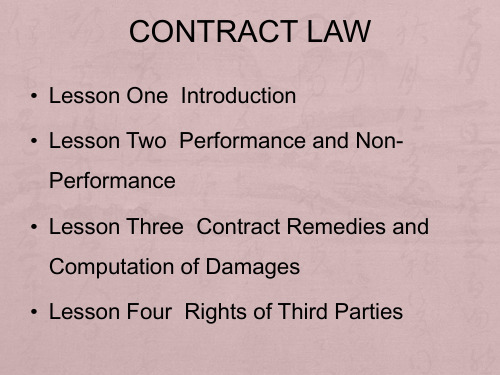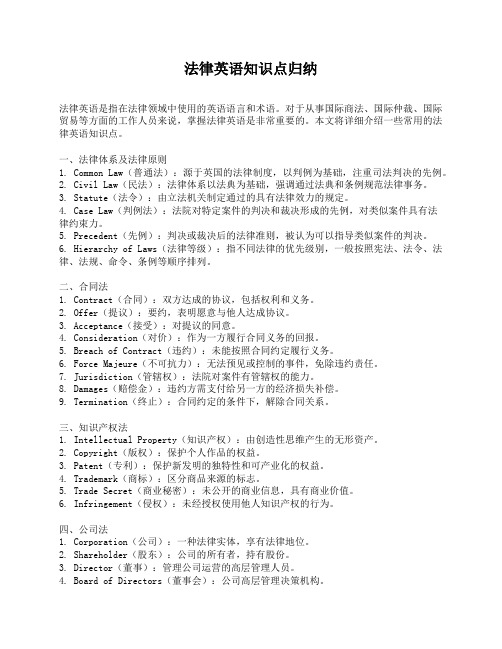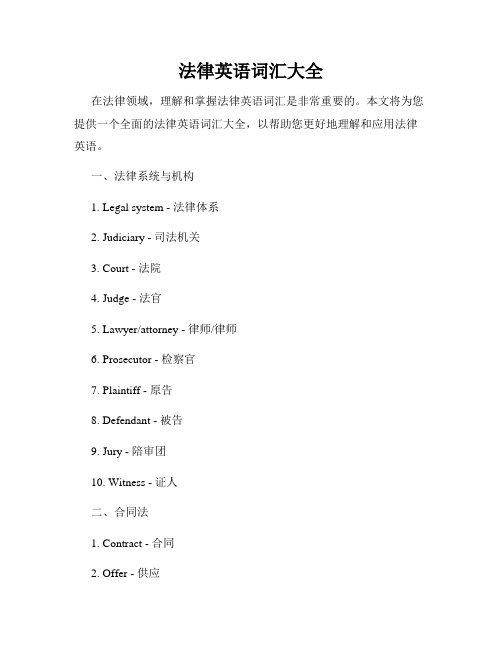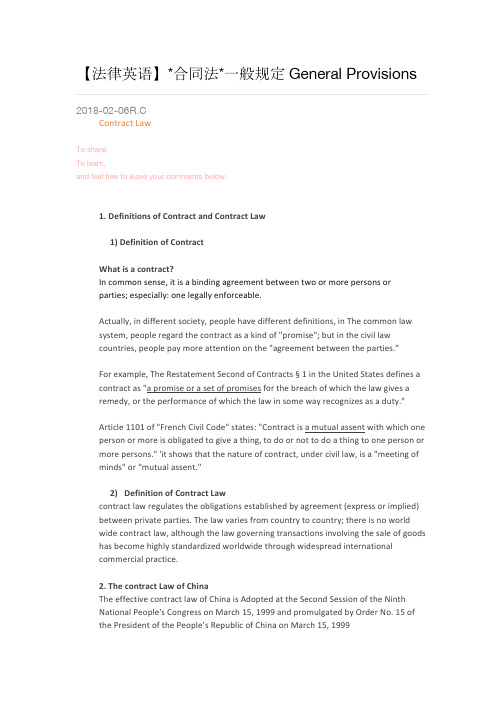法律英语合同法
法律英语课件-CONTRACTLAW(2017年)合同法

• 3.Necessary Elements of a Contract
• (1) There must be an agreement between the parties;
offeror by proper assent
Termination of Offer
Termination by Offeree • Rejection
– Not terminated by inquiries or request for different terms
• Counter-offer • Expiration set of promises where the law gives a remedy when breached, and the performance of which the law recognizes as a duty.
Contract law
• Contract law is most obviously the law relating to agreements or promises.
• The bulk of American contract law is judge-made case law.
• •
• The Uniform Commercial Code
• The Restatement of Contracts • 合同法注释汇编 • 合同法重述
• 2. Formation of Contract • offer and acceptance • Offeror and Offeree • Meeting of the minds • Mutual assent • Manifestation of willingness • “mirror image” • “mailbox rule”
法律英语知识点归纳

法律英语知识点归纳法律英语是指在法律领域中使用的英语语言和术语。
对于从事国际商法、国际仲裁、国际贸易等方面的工作人员来说,掌握法律英语是非常重要的。
本文将详细介绍一些常用的法律英语知识点。
一、法律体系及法律原则1. Common Law(普通法):源于英国的法律制度,以判例为基础,注重司法判决的先例。
2. Civil Law(民法):法律体系以法典为基础,强调通过法典和条例规范法律事务。
3. Statute(法令):由立法机关制定通过的具有法律效力的规定。
4. Case Law(判例法):法院对特定案件的判决和裁决形成的先例,对类似案件具有法律约束力。
5. Precedent(先例):判决或裁决后的法律准则,被认为可以指导类似案件的判决。
6. Hierarchy of Laws(法律等级):指不同法律的优先级别,一般按照宪法、法令、法律、法规、命令、条例等顺序排列。
二、合同法1. Contract(合同):双方达成的协议,包括权利和义务。
2. Offer(提议):要约,表明愿意与他人达成协议。
3. Acceptance(接受):对提议的同意。
4. Consideration(对价):作为一方履行合同义务的回报。
5. Breach of Contract(违约):未能按照合同约定履行义务。
6. Force Majeure(不可抗力):无法预见或控制的事件,免除违约责任。
7. Jurisdiction(管辖权):法院对案件有管辖权的能力。
8. Damages(赔偿金):违约方需支付给另一方的经济损失补偿。
9. Termination(终止):合同约定的条件下,解除合同关系。
三、知识产权法1. Intellectual Property(知识产权):由创造性思维产生的无形资产。
2. Copyright(版权):保护个人作品的权益。
3. Patent(专利):保护新发明的独特性和可产业化的权益。
4. Trademark(商标):区分商品来源的标志。
法律英语中合同的条款及规定

法律英语中合同的条款及规定Contracts are an essential part of legal English, as they establish the rights and obligations of the parties involved. 合同是法律英语中必不可少的一部分,因为它们确立了参与各方的权利和义务。
A contract typically includes various clauses and provisions that outline the terms of the agreement. 合同通常包括各种条款和规定,概述了协议的条款。
It is crucial for these clauses to be clear, precise, and legally sound to avoid potential disputes or misunderstandings. 这些条款必须清晰、精确和法律上健全,以避免潜在的纠纷或误解。
Both parties must fully understand the implications of the contract and willingly consent to its terms for it to be considered valid. 双方都必须充分理解合同的意义,并自愿同意其条款,才能被视为有效。
One of the most critical aspects of a contract is the inclusion of specific clauses that address potential issues and risks. 合同中最关键的方面之一是包括针对潜在问题和风险的具体条款。
These may include clauses related to breach of contract, dispute resolution, liability, indemnity, and termination. 这些可能包括与违约、争议解决、责任、赔偿和终止有关的条款。
法律英语词汇大全

法律英语词汇大全法律在现代社会中扮演着重要的角色,而法律英语作为一门专门的语言学科,具有其自身的特点和词汇体系。
本文将为您提供一份法律英语词汇大全,帮助您更好地理解和运用法律英语。
一、合同(Contracts)1. Offer(要约)- An expression of willingness to enter into a contractual agreement.2. Acceptance(接受)- The act of agreeing to the terms of an offer made by another party.3. Consideration(对价)- Something of value exchanged for the promise of another party in a contract.4. Breach(违约)- The failure to fulfill the terms of a contract withouta legitimate excuse.5. Termination(终止)- The ending or cancellation of a contract by the parties involved.6. Damages(损害赔偿)- The monetary compensation awarded to a party who suffers harm as a result of a breach of contract.7. Force Majeure(不可抗力)- An unforeseeable and uncontrollable event that prevents the fulfillment of contractual obligations.8. Assignment(转让)- The transfer of rights and obligations under a contract from one party to another.9. Non-performance(不履行义务)- The failure to fulfill contractual responsibilities.10. Confidentiality(保密性)- The requirement to keep certain information obtained during the course of a contract confidential.二、法院和司法程序(Courts and Judicial Procedures)1. Plaintiff(原告)- The party who initiates a lawsuit by filing a complaint in court.2. Defendant(被告)- The party against whom the lawsuit is filed and who must respond to the complaint.3. Trial(审判)- A formal legal proceeding in court in which evidence is presented and a decision is reached.4. Evidence(证据)- The information presented in court to support or refute a claim.5. Witness(证人)- A person who provides testimony under oath in court.6. Verdict(裁决)- The decision reached by the judge or jury in a trial.7. Appeal(上诉)- The process of asking a higher court to review and overturn a decision made by a lower court.8. Jurisdiction(管辖权)- The authority of a court to hear and decide a specific type of case.9. Subpoena(传票)- A legal document that requires a person to appear in court or produce evidence.10. Contempt of Court(蔑视法庭)- Behavior that disrespects or obstructs the functioning of a court, punishable by fines or imprisonment.三、知识产权(Intellectual Property)1. Patent(专利)- An exclusive right granted to an inventor to protect their invention from being used, made, or sold by others.2. Trademark(商标)- A distinctive sign or symbol that identifies and distinguishes the goods or services of one party from those of others.3. Copyright(版权)- The exclusive rights granted to authors, artists, and other creators to protect their original works.4. Infringement(侵权)- The unauthorized use or reproduction of intellectual property protected by law.5. Licensing(许可证)- The process of granting permission to use intellectual property to another party.6. Trade Secret(商业秘密)- Confidential information that provides a competitive advantage to its owner and is protected from disclosure.7. Royalties(专利权使用费)- Payments made to the owner of intellectual property for the use or sale of their rights.8. Fair Use(合理使用)- The limited use of copyrighted material without the permission of the copyright holder, typically for purposes such as criticism, commentary, or education.9. Anti-counterfeiting(反盗版)- Measures taken to prevent the unauthorized production, distribution, and sale of counterfeit goods.10. Infringement Notice(侵权通知)- A formal notice sent to an alleged infringer of intellectual property rights, demanding that they cease their infringing activities.这份法律英语词汇大全涵盖了合同、法院和司法程序以及知识产权等方面的关键词汇,能够帮助您更好地理解和运用法律英语。
何家弘 法律英语 第九章 合同法

何家弘法律英语第九章合同法全文共3篇示例,供读者参考篇1Chapter Nine of He Jiahong's book "Legal English" discusses contract law. In this chapter, the author examines the principles of contract law in both common law and civil law jurisdictions, as well as the key elements of a contract, including offer, acceptance, consideration, intention to create legal relations, and capacity.One of the main topics covered in this chapter is the different types of contracts, including bilateral contracts, unilateral contracts, and contracts under seal. In addition, the author explores the concept of implied contracts and the distinction between formal and informal contracts.He Jiahong also discusses the formation of contracts, including the importance of offer and acceptance in creating a legally binding agreement. The author explains how an offer can be terminated, revoked, or rejected, and the requirements for acceptance to be valid.Another important aspect of contract law that is examined in this chapter is the doctrine of consideration. He Jiahong explains the significance of consideration in contract formation and the rules regarding adequacy of consideration and past consideration.Furthermore, the author delves into the principles of intention to create legal relations and capacity in contract law. He explains how parties must have the intention to be legally bound by the terms of a contract for it to be enforceable, and the rules regarding minors, intoxicated persons, and mentally incapacitated individuals entering into contracts.Overall, Chapter Nine of "Legal English" by He Jiahong provides a comprehensive overview of contract law principles and key concepts. By examining the various aspects of contract formation, the author offers a thorough understanding of the legal framework that governs contractual relationships in both common law and civil law systems.篇2Title: Chapter Nine of He Jiahong's "Legal English: Contract Law"Chapter Nine of He Jiahong's "Legal English: Contract Law" delves into the intricate details of contract law and provides a comprehensive overview of the key concepts and principles governing contractual relationships. This chapter examines the formation, interpretation, and enforcement of contracts, as well as the rights and obligations of the parties involved.One of the central themes of this chapter is the concept of offer and acceptance, which is essential for the formation of a valid contract. According to He Jiahong, an offer is a proposal by one party to enter into a contract on certain terms, while acceptance is the unconditional agreement to the terms of the offer. The chapter outlines the requirements for a valid offer and acceptance, including communication of the offer and acceptance, intention to create legal relations, and certainty of terms.Moreover, He Jiahong discusses the importance of consideration in contract law, which refers to the exchange of something of value between the parties. He explains that consideration is necessary to make a contract legally binding and distinguishes it from a mere promise or gift. The chapter explores different types of consideration, such as goods, services,or money, and highlights the role of consideration in preventing gratuitous promises.Furthermore, this chapter addresses the issue of contractual interpretation, emphasizing the importance of interpreting contracts objectively and in accordance with the parties' intentions. He Jiahong explains that the courts will consider the language of the contract, the surrounding circumstances, and the parties' conduct to determine the meaning of the agreement. He also discusses the various rules of contractual interpretation, such as the contra proferentem rule and the parole evidence rule.In addition, He Jiahong examines the remedies available for breach of contract, including damages, specific performance, and injunctions. He explains that damages are the most common remedy for breach of contract and can be awarded to compensate the non-breaching party for any losses suffered as a result of the breach. The chapter also explores the principles governing the assessment of damages, such as remoteness, mitigation, and causation.Overall, Chapter Nine of He Jiahong's "Legal English: Contract Law" provides a comprehensive overview of the key principles and concepts of contract law. It offers valuable insightsinto the formation, interpretation, and enforcement of contracts, as well as the rights and obligations of the parties involved. This chapter serves as an essential resource for students, practitioners, and scholars seeking to deepen their understanding of contract law in a legal English context.篇3Chapter 9 Contract LawContract law is a fundamental part of the legal system in most countries around the world. The principles of contract law govern the relationships between parties entering into agreements, and are essential for regulating commerce and promoting fairness in business dealings. In this chapter, we will examine the key concepts and principles of contract law as outlined by legal scholar He Jiahong in his book on legal English.One of the fundamental principles of contract law is the concept of offer and acceptance. An offer is a promise by one party to do something in exchange for something from the other party, and acceptance is the agreement to the terms of the offer. For a contract to be legally binding, there must be a valid offer and acceptance between the parties involved. This principle iscrucial in determining whether a contract exists and what the terms of the contract are.Another important concept in contract law is consideration. Consideration is the exchange of something of value between the parties, such as money, goods, or services. In order for a contract to be enforceable, there must be consideration from both parties. This principle ensures that both parties are giving something of value in exchange for the promises made in the contract.The principle of intention to create legal relations is also essential in contract law. This principle states that the parties must have intended for their agreement to be legally binding. In commercial agreements, this intention is usually assumed. However, in other types of agreements, such as family agreements, the intention to create legal relations may not be present, and therefore the agreement may not be legally binding.One of the key components of contract law is the concept of capacity. Capacity refers to the legal ability of a party to enter into a contract. Minors, people of unsound mind, and those under the influence of drugs or alcohol may lack capacity toenter into a contract. In these cases, the contract may be voidable by the party lacking capacity.Contracts can also be classified into different types, such as bilateral and unilateral contracts. Bilateral contracts involve a promise from each party to the other, while unilateral contracts involve a promise from one party in exchange for an act from the other party. Understanding the different types of contracts is essential for interpreting and enforcing contract law.In conclusion, contract law is a complex and important area of legal study. Understanding the key concepts and principles of contract law is essential for anyone entering into business agreements or other contractual relationships. By following the guidelines outlined in this chapter, parties can ensure that their agreements are legally binding and enforceable.。
法律英语词汇大全

法律英语词汇大全在法律领域,理解和掌握法律英语词汇是非常重要的。
本文将为您提供一个全面的法律英语词汇大全,以帮助您更好地理解和应用法律英语。
一、法律系统与机构1. Legal system - 法律体系2. Judiciary - 司法机关3. Court - 法院4. Judge - 法官5. Lawyer/attorney - 律师/律师6. Prosecutor - 检察官7. Plaintiff - 原告8. Defendant - 被告9. Jury - 陪审团10. Witness - 证人二、合同法1. Contract - 合同2. Offer - 供应3. Acceptance - 接受4. Consideration - 对价5. Mutual assent - 相互同意6. Breach of contract - 违约7. Performance - 履行8. Termination - 终止9. Damages - 损害赔偿三、刑法1. Crime - 犯罪2. Offense - 违反3. Felony - 重罪4. Misdemeanor - 轻罪5. Homicide - 杀人罪6. Robbery - 抢劫罪7. Theft - 盗窃罪8. Assault - 袭击罪9. Burglary - 入室盗窃罪10. Arson - 纵火罪四、知识产权1. Intellectual property - 知识产权2. Patent - 专利3. Trademark - 商标4. Copyright - 版权5. Infringement - 侵权6. Royalties - 版权使用费五、公司法1. Corporation - 公司2. Shareholder - 股东3. Board of directors - 董事会4. Corporate governance - 公司治理5. Merger - 合并6. Acquisition - 收购7. IPO (Initial Public Offering) - 首次公开发行六、国际法1. International law - 国际法2. Treaty - 条约3. Diplomacy - 外交4. Sovereignty - 主权5. Human rights - 人权6. United Nations - 联合国7. World Trade Organization - 世界贸易组织七、家庭法1. Family law - 家庭法2. Divorce - 离婚3. Child custody - 子女抚养权4. Alimony - 赡养费5. Prenuptial agreement - 婚前协议6. Domestic violence - 家庭暴力八、地产法1. Property law - 房地产法2. Real estate - 房地产3. Landlord - 房东4. Tenant - 租户5. Lease agreement - 租赁协议6. Eviction - 驱逐九、金融法1. Financial law - 金融法2. Banking - 银行业3. Insurance - 保险4. Securities - 证券5. Insider trading - 内幕交易6. Money laundering - 洗钱十、法律程序1. Legal procedure - 法律程序2. Jurisdiction - 司法管辖权3. Due process - 正当程序4. Statute of limitations - 诉讼时效5. Appeal - 上诉6. Habeas corpus - 人身保护令总结:本文提供了一个全面的法律英语词汇大全,包含了法律体系与机构、合同法、刑法、知识产权、公司法、国际法、家庭法、地产法、金融法以及法律程序等方面的常用词汇。
LEC学习材料-合同法

合同法CONTRACTSIn law, a contract is a binding legal agreement that is enforceable in a court of law or by binding arbitration. That is to say, a contract is an exchange of promises with a specific remedy for breach. Agreement is said to be reached when an offer capable of immediate acceptance is met with a "mirror image" acceptance (i.e., an unqualified acceptance). The parties must have the necessary capacity to contract and the contract must not be either trifling, indeterminate, impossible, or illegal. Breach of contract is recognized by the law and remedies can be provided.As long as the good or service provided is legal, any oral agreement between two parties can constitute a binding legal contract. The practical limitation to this, however, is that only parties to a written agreement have material evidence (the written contract itself) to prove the actual terms uttered at the time the agreement was struck. In daily life, most contracts can be and are made orally, such as purchasing a book or a sandwich. Sometimes written contracts are required by either the parties, or by statutory law within various jurisdiction for certain types of agreement, for example when buying a house or land.Contract formationIn common-law systems, the five key requirements for the creation of a contract are:1. offer and acceptance (agreement)2. consideration3. an intention to create legal relations4. legal capacity5. formalitiesOffer and acceptance analysis is a traditional approach in contract law used to determine whether an agreement exists between two parties. As a contract is an agreement, an offer is an indication by one person (the "offeror") to another (the "offeree") of the offeror's willingness to enter into a contract on certain terms without further negotiations. A contract is said to come into existence when acceptance of an offer (agreement to the terms in it) has been communicated to the offeror by the offeree.Treitel defines an offer as "an expression of willingness to contract on certain terms, made with the intention that it shall become binding as soon as it is accepted by the person to whom it isaddressed", the "offeree". An offer is a statement of the terms on which the offeror is willing to be bound.The "expression" referred to in the definition may take different forms, such as a letter, newspaper, fax, email and even conduct, as long as it communicates the basis on which the offeror is prepared to contract.Whether two parties have an agreement or a valid offer is an issue which is determined by the court using the Objective test (Smith v. Hughes). Therefore the "intention" referred to in the definition is objectively judged by the courts. In the English case of Smith v. Hughes the court emphasised that the important thing is not a party's real intentions but how a reasonable person would view the situation. This is due mainly to common sense as each party would not wish to breach his side of the contract if it would make him or her culpable to damages, it would especially be contrary to the principle of certainty and clarity in commercial contract and the topic of mistake and how it affects the contract. As a minimum requirement the conditions for an offer should include at least the following 4 conditions: Delivery date, price, terms of payment that includes the date of payment and detail description of the item on offer including a fair description of the condition or type ofservice. Without one of the minimum requirements of condition an offer of sale is not seen as a legal offer but rather seen as an advertisement.Acceptance is a final and unqualified expression of assent to the terms of an offer. It is no defense to an action based on a contract for the defendant to claim that he had not intended to be bound by the agreement, if his conduct demonstrated that he had.Rules of acceptanceThere are several rules dealing with the communication of acceptance:•The acceptance must be communicated: see Powell v Lee (1908) Prior to acceptance, an offer may be withdrawn.•An exception exists in the case of unilateral contracts, in which the offeror makes an offer to the world which can be accepted by some act. A classic instance of this is the case ofCarlill v. Carbolic Smoke Ball Co. [1892] 2 Q.B. 484 in which an offer was made to pay £100 to anyone who having boughtthe offeror's product and used it in accordance with the instructions nonetheless contracted influenza. The plaintiff did so and the court ordered payment of the £100. Heractions accepted the offer - there was no need to communicate acceptance. Typical cases of unilateral offers are advertisements of rewards (e.g., for the return of a lost dog).•An offer can only be accepted by the offeree, that is, the person to whom the offer is made.•An offeree is not usually bound if another person accepts the offer on his behalf without his authorization, the exceptions to which are found in the law of agency, where an agent may have apparent or ostensible authority, or the usual authority of an agent in the particular market, even if the principal did not realize what the extent of this authority was, and someone on whose behalf an offer has been purportedly accepted it may also ratify the contract within a reasonable time, binding both parties.•It may be implied from the construction of the contract that the offeror has dispensed with the requirement of communication of acceptance (called waiver of communication - which is generally implied in unilateral contracts): see also Re Selectmove Ltd [1994] BCC 349.•If the offer specifies a method of acceptance (such as by post or fax), acceptance must be by a method that is no lesseffective from the offeror's point of view than the method specified. The exact method prescribed may have to be used in some cases but probably only where the offeror has used very explicit words such as "by registered post, and by that method only": see Yates Building Co. Ltd v. R.J. Pulleyn & Sons (York) Ltd (1975) 119 Sol. Jo. 370.•Silence cannot be construed as acceptance: see Felthouse v.Bindley (1862) 142 ER 1037.•However, acceptance may be inferred from conduct.Vitiating FactorsThere are the factors affecting the validity of an otherwise effective contract. They include mistakes, misrepresentation, duress, undue influence and illegality.DischargeOnce it is determined that a party is under an immediate duty to perform, the duty to perform must be discharged. A contract may be discharged in one of the following ways:·By performance·By tender of performance·By frustration·By operation of law·By occurrence of condition subsequent·By illegality·By rescission·By novation·By cancellation·By release·By substituted contract·By accord and satisfaction·By account stated·By lapse·By effect of running of statute of limitationsBreach of contract is a legal concept in which a binding agreement or bargained-for exchange is not honored by one or more of the parties to the contract by non-performance orinterference with the other party's performance. If the party does not fulfill his contractual promise, or has given information to the other party that he will not perform his duty as mentioned in the contract or if by his action and conduct he seems to be unable to perform the contract, he is said to breach the contract.Remedies for Breach of Contract•Damages, which may include:o Compensatory damageso Punitive damageso Incidental damageso Liquidated damageso Nominal damages•Coercive reliefo Specific performanceo Injunctionso Restitutiono Account of profits【版权声明】《合同法CONTRACTS》的版权属于法律英语证书(LEC)全国统一考试委员会所有。
【法律英语】合同法 一般规定(英文)

[B]Article 2 A contract in this Law refers to an agreement amongnatural persons, legal persons or other organizations as equal parties for the establishment, modification, termination of a relationship involving the civil rights and obligations of such entities. Agreements concerning personal relationships such as marriage, adoption, guardianship, etc. shall be governed by the provisions in other laws.
- 1、下载文档前请自行甄别文档内容的完整性,平台不提供额外的编辑、内容补充、找答案等附加服务。
- 2、"仅部分预览"的文档,不可在线预览部分如存在完整性等问题,可反馈申请退款(可完整预览的文档不适用该条件!)。
- 3、如文档侵犯您的权益,请联系客服反馈,我们会尽快为您处理(人工客服工作时间:9:00-18:30)。
2020/5/4
法律英语
1
The web of the law
May not be quite seamless 法律之网可能并非结实无缝 They are not ironclad and unchanging 法律并非打不破和不可改变。
2020/5/4
法律英语
2
2020/5/4
法律英语
12
“ordinary” common law relief of damages
普通法规定的赔偿金救济
“extraordinary” equity remedy of specific performance 衡平法规定的特定履行救济
2020/5/4
法律英语
13
Contract —— an agreement between two or more persons.
If the agreement is broken, then the law provides certain remedies.
2020/5/4
法律英语
3
Three Factors
There are three factors necessary to create a contract:
2020/5/4
法律英语
4
Example of Contracts
Employment contracts Service Contracts
Insurance Contracts
Sale of Intangibles(stocks, bonds, patents, copyrights,etc)
2020/5/4
法律英语
11
Suppose that a vendor of house backs out on the deal. The vendee may sue for damages under common-law principles, but if he wants a court to force the seller to sell (specific performance) he uses principles developed in equity.
2020/5/4
法律英语
5
Background
Uniform Commercial Code Consumer Protection Statutes Labor Law Insurance Law
2020/5/4
涉及合同问题
法律英语
7
美国合同法
由法律保证执行 强制执行的限度
法律补救方法
1) an offer, 2) acceptance, and 3) consideration. One party makes an offer, the second party
must accept the offer and there must be consideration exchanged. Consideration has to be something of value.
Contract Definition
A contract is basically an agreement between two or more people which creates an obligation to do, or not do, something.
The agreement creates a legal relationship of rights and duties.
2020/5/4
Expectation damages
Agreed upon remedies
Equitable relief
法律英语
8
Special characteristics of equity law: relief in the form of specific performance
the injunction
the development of so called maxims of equity law
2020/5/4
法律英语
9
However, equitable relief regularly will lie only when the common law relief is inadequate.
2020/5/4
法律英语
10
For instance, specific performance for the purchase of real property will be granted because common law damages are deemed to be inadequate since they cannot compensate the buyer in view of the uniqueness attributed to real property.
Not merely a shared belief A common understanding as to something
2020/5/4
法律英语
14
Contract
Document The set of papers in which such
agreement is set forth. 文件——陈述契约的一系列文件。
2020/5/4
法律英语Βιβλιοθήκη 16Three elements in a transaction ——contract
1. The agreement-in-fact
2. The agreement-in-written
2020/5/4
法律英语
15
For lawyers
Contract ---- an agreement that has legal effect.
It creates obligations for which some sort of legal enforcement will be available if performance is not forthcoming as promised.
